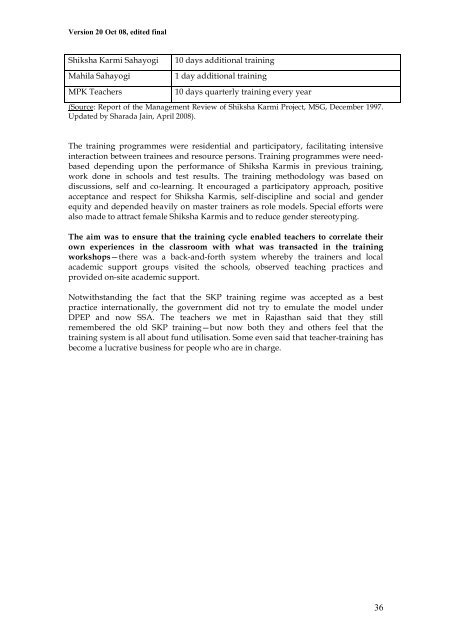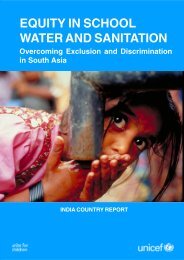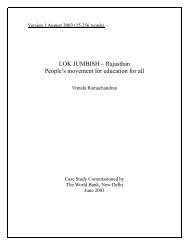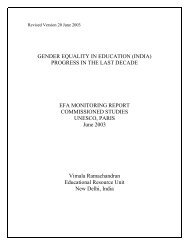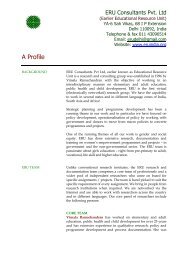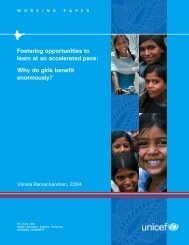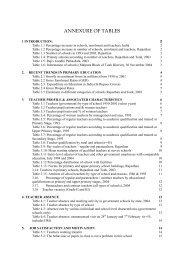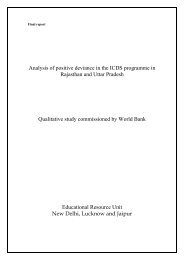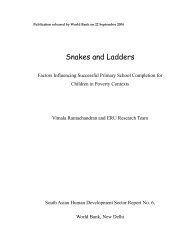primary school teachers the twists and turns of everyday practice
primary school teachers the twists and turns of everyday practice
primary school teachers the twists and turns of everyday practice
Create successful ePaper yourself
Turn your PDF publications into a flip-book with our unique Google optimized e-Paper software.
Version 20 Oct 08, edited final<br />
Shiksha Karmi Sahayogi<br />
Mahila Sahayogi<br />
MPK Teachers<br />
10 days additional training<br />
1 day additional training<br />
10 days quarterly training every year<br />
(Source: Report <strong>of</strong> <strong>the</strong> Management Review <strong>of</strong> Shiksha Karmi Project, MSG, December 1997.<br />
Updated by Sharada Jain, April 2008).<br />
The training programmes were residential <strong>and</strong> participatory, facilitating intensive<br />
interaction between trainees <strong>and</strong> resource persons. Training programmes were needbased<br />
depending upon <strong>the</strong> performance <strong>of</strong> Shiksha Karmis in previous training,<br />
work done in <strong>school</strong>s <strong>and</strong> test results. The training methodology was based on<br />
discussions, self <strong>and</strong> co-learning. It encouraged a participatory approach, positive<br />
acceptance <strong>and</strong> respect for Shiksha Karmis, self-discipline <strong>and</strong> social <strong>and</strong> gender<br />
equity <strong>and</strong> depended heavily on master trainers as role models. Special efforts were<br />
also made to attract female Shiksha Karmis <strong>and</strong> to reduce gender stereotyping.<br />
The aim was to ensure that <strong>the</strong> training cycle enabled <strong>teachers</strong> to correlate <strong>the</strong>ir<br />
own experiences in <strong>the</strong> classroom with what was transacted in <strong>the</strong> training<br />
workshops—<strong>the</strong>re was a back-<strong>and</strong>-forth system whereby <strong>the</strong> trainers <strong>and</strong> local<br />
academic support groups visited <strong>the</strong> <strong>school</strong>s, observed teaching <strong>practice</strong>s <strong>and</strong><br />
provided on-site academic support.<br />
Notwithst<strong>and</strong>ing <strong>the</strong> fact that <strong>the</strong> SKP training regime was accepted as a best<br />
<strong>practice</strong> internationally, <strong>the</strong> government did not try to emulate <strong>the</strong> model under<br />
DPEP <strong>and</strong> now SSA. The <strong>teachers</strong> we met in Rajasthan said that <strong>the</strong>y still<br />
remembered <strong>the</strong> old SKP training—but now both <strong>the</strong>y <strong>and</strong> o<strong>the</strong>rs feel that <strong>the</strong><br />
training system is all about fund utilisation. Some even said that teacher-training has<br />
become a lucrative business for people who are in charge.<br />
36


